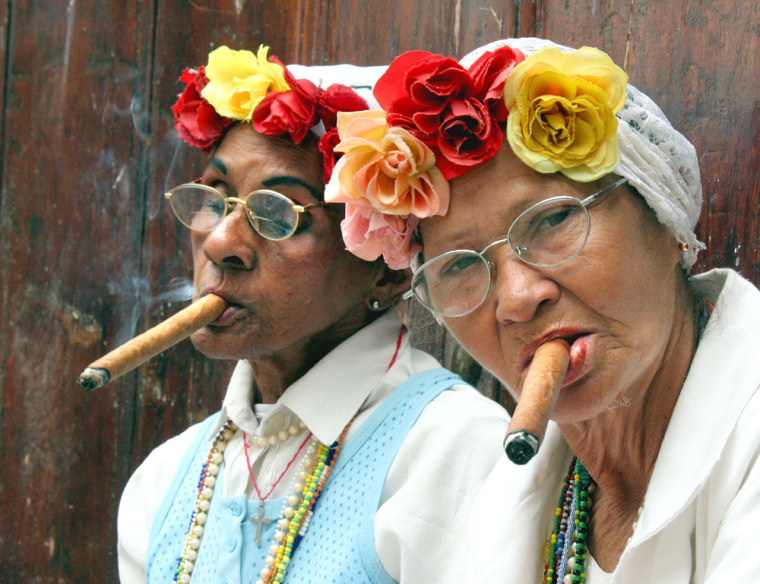If the threat of cancer hasn’t convinced smokers in Cuba to quit, maybe the law will.
Starting Monday new legislation takes effect to help protect people from the harmful effects of passive smoking and to keep minors from lighting up.
The law bans smoking in not just government buildings, stores, restaurants, schools and hospitals, but also in hospital parking lots, school playgrounds, taxis, nightclubs and funeral parlors.
The law specifically targets the growing tobacco abuse problem among teenagers.
It forbids the sale of cigarettes and cigars to consumers under 16 years of age. While this law has been on the books for several years, store clerks seldom ask teenagers buying tobacco for proof of age.
The law also forbids the sale of tobacco products and alcohol less than 100 yards from any school or day care center. Over the weekend hundreds of concession stands in the Cuban capital removed cigars, cigarettes and rum from sale.
Officials say the smoking ban is part of a new campaign to persuade people to kick the habit by “a change in people’s attitudes,” a daunting task anywhere but especially on a tobacco-growing island synonymous with the world’s best cigars and a $200 million export industry.
Teens picking up the habit
One in every three Cubans smokes, although their numbers have dwindled over the last decade. According to a study by the Health Ministry’s Institute of Hygiene, Epidemiology and Microbiology, 37 percent of Cubans over 16 smoked in 1995. By 2001, that number dropped to 31.9 percent.
Despite the decline among adults, adolescents are now picking up the habit at nearly double the rate of a few years ago, from 7 percent in 1990 to 13 percent by 2001.
That same year, a survey by the World Health Organization found that nearly one-third of all Cuban children between the ages of 12 and 14 had tried smoking.
Cuban health officials have devised an anti-smoking campaign especially directed at younger consumers.
As of Monday, the law declares all Cuban schools “no-smoking zones.”
All biology classes taught on the junior and high school levels have been reworked to include information about the perils of smoking.
A new series of public health spots begins running on Cuban TV, specifically directed at younger audiences. One shows a teenager who smokes and listens to heavy metal music losing his girlfriend to his smoke-free buddy, who offers his novia a flower instead of a cigarette.
Doris Acevedo at Cuban TV believes these new public service announcements will be “twice as effective” than those in other countries where slick advertising by the tobacco industry undermines the health message. With few exceptions like promoting a sports event or concert, the Cuban government prohibits consumer advertising on its state-run media.
Even without consumer advertising, tobacco still accounts for 18.5 percent of all retail sales. A study found that Cubans smoked more than 11 billion cigarettes last year.
This past autumn, stores across Cuba were instructed to pull all cigarette displays that promoted tobacco products, most showing pictures of young people laughing and smoking.
Strong public health message
Instead, cigarette packs are now being stamped with public health messages like “We have the right to breathe clean air” and “Protect your family from tobacco.”
According to health officials, the smoking ban aims to improve the overall health of smokers and non-smokers alike. Cuba’s vast network of neighborhood clinics will be offering free workshops to help people kick the habit.
The Health Ministry claims quitting is on the rise here. In 2000, a little more than 33,000 Cubans stopped smoking, while in 2002 that jumped to over 155,000. The goal this year is 200,000 or more.
Cancer linked to smoking kills about 5,000 Cubans a year, with tobacco blamed for 80 percent of all lung cancer on the island.
But to Gladys Martinez, a community-based nurse, the smoking ban is based on economics as much as health. “Smoking costs the country millions of dollars in medical expenditures and lost productivity,” she said.
Cuba’s not alone. Experts estimate that smoking-related diseases globally cost $200 billion annually.
Uphill battle to clear the air
Even with the law on their side, the Health Ministry admits it won’t be easy clearing the air.
On state radio Monday morning, one announcer fielded calls from irate listeners and suggested they view the law as “pro-health rather than anti-tobacco.”
Nathan Rodriguez takes public transit to school every day and the bus driver is seldom without a cigarette. Asthmatic, the teenager is bothered by second-hand smoke, but too afraid to speak up. “Maybe he’ll get angry, drive right past my stop, and then I’ll have no way to get to school.”
For 25 years, Fermin Rodriguez has smoked at work and has no plans to stop. The physical therapist at the National Sports Institute now shuts himself in his office to smoke in between patients.
“Under this new law, I have to leave the hospital, walk through the parking lot and go stand on the street to smoke. Since I don’t plan on stopping I guess I’ll be treating fewer patients during the day.”
